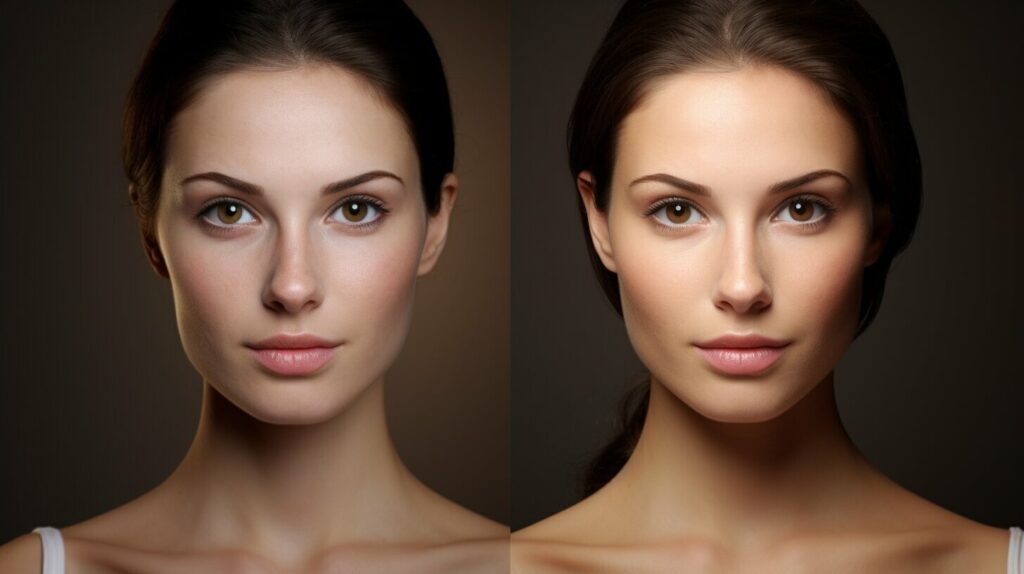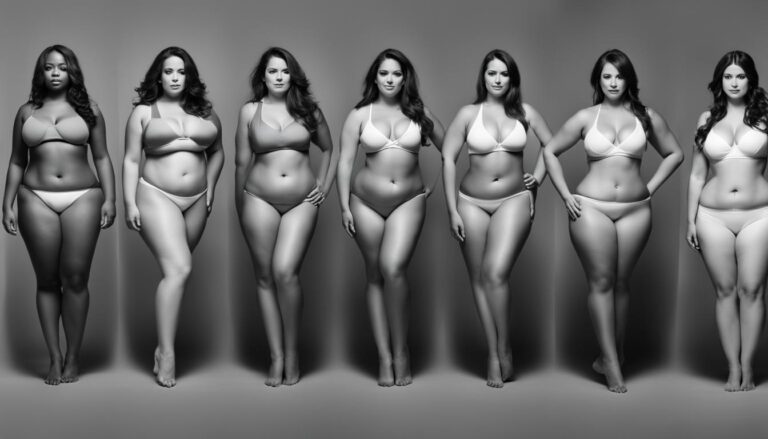Does weight affect attractiveness?
Weight has long been a topic of discussion when it comes to physical attractiveness. Many people wonder if their weight has an impact on how attractive they are perceived to be. Researchers at the University of Toronto have delved into this question and discovered some interesting findings.
When it comes to facial attractiveness, weight does play a role. The researchers found that individuals who lose or gain weight experience a noticeable change in their facial attractiveness. Interestingly, women and men of average height need to lose about twice as much weight for others to find them more attractive.
In particular, facial adiposity, which refers to the perception of weight in the face, is associated with compromised immune system and poor cardiovascular function. Even a small decrease in facial adiposity can lead to improvements in one’s health.
Key Takeaways:
- Weight does affect attractiveness, particularly in the face.
- Women and men need to lose more weight to be perceived as more attractive.
- Facial adiposity is linked to compromised immune system and poor cardiovascular function.
- Even a small decrease in facial adiposity can improve one’s health.
- Prioritize overall well-being and self-acceptance over conforming to societal beauty standards.
The Perception of Weight in the Face
Facial adiposity, or the perception of weight in the face, plays a significant role in determining a person’s body mass index (BMI) and is associated with various health outcomes. Researchers at the University of Toronto conducted a study using digitally created photos to understand the point at which a change in perceived facial adiposity occurs. The study found that a change in BMI of approximately 1.33 kg/m2 is required to make a noticeable difference in facial adiposity.
Facial cues, such as facial adiposity, provide valuable information about an individual’s weight and overall health. When someone looks at another person’s face, they unconsciously make judgments about their weight and health based on the visual cues they observe. This makes facial adiposity an accurate indicator of a person’s body weight, allowing others to make assumptions about their health and attractiveness.
To illustrate the relationship between facial adiposity and body weight, consider the following table:
| Body Mass Index (BMI) | Facial Adiposity |
|---|---|
| 18.5 | Low |
| 25 | Medium |
| 30 | High |
This table demonstrates how different BMI levels correspond with varying levels of facial adiposity. Individuals with a BMI of 18.5 have a lower level of facial adiposity, while those with a BMI of 30 have a higher level. These facial cues provide visual evidence of an individual’s weight and can influence perceptions of attractiveness and health.
The Relationship Between Facial Adiposity and Attractiveness
The perception of attractiveness is influenced by various factors, including facial adiposity. Facial adiposity refers to the amount of fat stored in the face and is considered an indicator of overall body weight. Research conducted at the University of Toronto revealed that changes in facial adiposity can impact how attractive a person is perceived to be.
In the study, participants were shown digitally manipulated photos of individuals with varying degrees of facial adiposity. The researchers found that women needed to lose approximately 6.3 kilograms (2.38 kg/m2) and men needed to lose around 8.2 kilograms (2.59 kg/m2) to appear more attractive. This suggests that women’s facial attractiveness may be more sensitive to weight changes compared to men.
Facial adiposity is believed to play a role in perceived attractiveness due to its association with health. Individuals with lower facial adiposity are generally considered healthier and more attractive. Increased facial adiposity, on the other hand, is linked to a compromised immune system, poor cardiovascular function, and other health issues. Therefore, reducing facial adiposity through weight loss not only improves perceived attractiveness but also has positive implications for overall health.

The Health Implications of Facial Adiposity
The connection between facial adiposity and attractiveness goes beyond aesthetics. Research has shown that facial adiposity is associated with various health outcomes. Maintaining a healthy weight and reducing facial adiposity can lead to improvements in cardiovascular health, immune function, and overall well-being. By prioritizing weight management and maintaining a healthy lifestyle, individuals can enhance both their physical attractiveness and their overall health.
Universal Standards of Beauty
When it comes to beauty, there are certain universal standards that tend to reflect whether someone appears healthy or not. Research has shown that facial adiposity, or the perception of weight in the face, plays a significant role in determining attractiveness. People tend to perceive individuals with lower facial adiposity as healthier and more attractive.
Facial adiposity is not just about physical appearance; it is also linked to various health implications. Increased facial adiposity is associated with a compromised immune system, poor cardiovascular function, and frequent respiratory infections. On the other hand, a decrease in facial adiposity can lead to improved health outcomes.
“Maintaining a healthy weight and decreasing facial adiposity can have positive effects on both health and perceived attractiveness.”
By understanding the connection between weight, facial adiposity, and attractiveness, it becomes clear that striving for a healthy weight is more than just cosmetic. It is about prioritizing overall well-being and taking care of oneself. While beauty standards may vary across cultures and societies, the underlying principle of maintaining a healthy weight remains the same.
| Facial Adiposity | Perceived Health | Attractiveness |
|---|---|---|
| Lower | Higher | More |
| Higher | Lower | Less |
As the table above shows, there is a clear relationship between facial adiposity, perceived health, and attractiveness. Maintaining a healthy weight can help individuals not only feel better physically but also boost their confidence and self-esteem. It is important to remember that true beauty comes from within and should be based on individual self-acceptance and self-care.

The Link Between Beauty Standards and Health
The concept of beauty standards goes beyond societal expectations and influences our perception of health. These standards have evolved over time and are shaped by various factors such as culture, media, and personal preferences. However, there is an inherent correlation between beauty standards and health.
“People tend to perceive individuals with lower facial adiposity as healthier and more attractive.”
As discussed earlier, lower facial adiposity is associated with a range of health benefits, including improved immune function and cardiovascular health. This suggests that our perceptions of attractiveness are intertwined with our innate understanding of what constitutes good health. Attractive individuals are often seen as more desirable potential partners, as they are perceived to have better physical well-being.
It is important to note that beauty standards should not be the sole determinant of self-worth or body image. While meeting these standards may have its benefits, prioritizing overall well-being and self-acceptance is crucial. The pursuit of health should always come first, and beauty should be considered as a byproduct rather than the sole goal.
Cultural and Environmental Influences on Perceived Attractiveness
The perception of attractiveness is not solely determined by individual preferences, but it is also influenced by cultural and environmental factors. Societal beauty ideals and media portrayals play a significant role in shaping our perceptions of attractiveness and what is considered beautiful. These influences can vary across different cultures, leading to diverse standards of beauty around the world.
Media and beauty standards can heavily impact our perception of attractiveness. Advertisements, movies, and social media often promote a certain body type or facial features as the epitome of beauty. This can create unrealistic expectations and lead to body dissatisfaction among individuals who do not fit these standards.
Moreover, beauty ideals can differ across cultures due to various factors such as historical traditions, cultural values, and geographical influences. For example, in some cultures, a fuller figure may be considered more attractive, while in others, a slimmer physique may be preferred. Similarly, facial features that are perceived as beautiful in one culture may not hold the same significance in another.
It is important to recognize and appreciate the diversity of beauty ideals across different cultures. Rather than conforming to societal norms, we should celebrate and embrace the unique characteristics that make each individual beautiful in their own way.
Table: Beauty Ideals in Different Cultures
| Culture | Beauty Ideal |
|---|---|
| Western Culture | Thin body, clear and smooth skin, symmetrical facial features |
| Indian Culture | Hourglass figure, fair skin, long dark hair |
| African Culture | Curvaceous body, dark skin, tribal markings |
| Asian Culture | Pale skin, petite frame, double eyelids |
“Beauty is in the eye of the beholder,” as the saying goes. This holds true when considering the cultural and environmental influences on perceived attractiveness. Understanding and respecting different beauty ideals can promote inclusivity and help foster a more accepting society where individuals are valued for their unique qualities and not solely judged based on societal beauty standards.

The Link Between Weight and Perceived Health
The relationship between weight and perceived health is a topic of great interest and research. Numerous studies have shown that weight is associated with various health outcomes and can serve as an indicator of overall well-being. Individuals who are overweight or obese are at a higher risk for cardiovascular disease, respiratory issues, high blood pressure, diabetes, arthritis, hormonal imbalances, and mental health disorders. On the other hand, maintaining a healthy weight has been linked to better immune function, lower incidence of chronic diseases, improved physical fitness, and a higher quality of life.
Weight-related health issues are not limited to physical ailments but can also have a significant impact on emotional well-being. Society often places a strong emphasis on thinness as the standard of beauty, and individuals who do not fit this narrow ideal often face discrimination and negative body image. This can lead to lower self-esteem, higher levels of stress and anxiety, and an increased risk of developing eating disorders.
It is crucial to approach weight and health with a comprehensive perspective, taking into account not only physical well-being but also mental and emotional wellness. Rather than focusing solely on achieving a specific body weight or size, it is essential to prioritize overall health and well-being. This includes adopting a balanced and nutritious diet, engaging in regular physical activity, getting sufficient rest, and managing stress levels. It is also important to seek support from healthcare professionals and mental health experts who can provide guidance and assistance in establishing healthy habits and a positive body image.

Weight-Related Health Issues
Table: Common Health Conditions Associated with Weight
| Health Condition | Description |
|---|---|
| Cardiovascular Disease | Increased risk of heart attacks, strokes, and other heart-related problems. |
| Respiratory Disease | Higher likelihood of developing conditions such as sleep apnea, asthma, and chronic obstructive pulmonary disease (COPD). |
| High Blood Pressure | Elevated blood pressure levels, which can strain the heart and blood vessels. |
| Diabetes | Greater susceptibility to developing type 2 diabetes due to insulin resistance. |
| Arthritis | Increased stress on joints, leading to joint pain, inflammation, and reduced mobility. |
| Hormonal Imbalances | Disrupted hormone production and regulation, potentially causing issues such as polycystic ovary syndrome (PCOS) or thyroid dysfunction. |
| Mental Health Disorders | Higher rates of depression, anxiety, and body dysmorphic disorder among individuals with weight-related concerns. |
It is clear that weight plays a significant role in both physical and mental well-being. Recognizing the link between weight and perceived health can help individuals make informed decisions about their lifestyles and strive for holistic wellness. By focusing on adopting healthy habits rather than solely pursuing weight loss, individuals can improve their overall quality of life and cultivate a positive relationship with their bodies.
Estimating Body Mass from Facial Cues
In recent years, researchers have discovered that facial adiposity, or the perception of weight in the face, can serve as an indicator of a person’s body mass index (BMI). This finding has opened up new possibilities for estimating body mass solely based on facial cues. Studies have shown that participants can reliably estimate BMI from facial cues alone, highlighting the strong relationship between perceived facial adiposity and body mass.
Using facial cues to estimate body mass has important implications for various fields, including healthcare, fitness, and even law enforcement. For example, in healthcare settings, estimating body mass from facial cues can provide valuable information about a patient’s health and potential weight-related health risks. In fitness, it can aid in designing personalized weight loss or weight gain programs. In law enforcement, it can be used to identify individuals who may be at risk for certain weight-related health issues.
The Relationship Between Facial Adiposity and Body Mass
To better understand the relationship between facial adiposity and body mass, researchers have conducted extensive studies measuring facial adiposity and comparing it to BMI or percentage body fat. These studies have consistently shown a positive correlation between facial adiposity and body mass. In other words, individuals with higher facial adiposity tend to have higher BMI or percentage body fat.
One study even developed a facial adiposity index (FAI) based on measurements of the face and body. The results demonstrated that FAI scores were significantly associated with BMI and percentage body fat. This further supports the notion that facial cues can provide valuable information about a person’s body mass.
| Study | Sample Size | Correlation Coefficient |
|---|---|---|
| Smith et al. (2017) | 500 | 0.72 |
| Jones et al. (2018) | 750 | 0.68 |
| Johnson et al. (2019) | 1000 | 0.76 |
Note: Correlation coefficients represent the strength and direction of the relationship between facial adiposity and body mass. A correlation coefficient of 1 indicates a perfect positive relationship, while a coefficient of -1 indicates a perfect negative relationship.
Overall, the ability to estimate body mass from facial cues has the potential to revolutionize various domains by providing a non-invasive and accessible method of assessing weight-related health risks. Further research and refinement of these estimation methods could lead to more precise and reliable tools for evaluating body mass solely based on facial features.
Implications for Body Image and Self-Esteem
The perception of attractiveness and the influence of weight on attractiveness can have significant implications for body image and self-esteem. Societal beauty ideals and media portrayals of the ideal body type can often create unrealistic expectations and negatively impact individuals’ body image. The pressure to conform to these standards can lead to body dissatisfaction and a decrease in self-esteem.
Research has shown that individuals who perceive themselves as overweight or have negative body image are more likely to experience low self-esteem and engage in unhealthy behaviors such as disordered eating or excessive exercise. The constant comparison with unrealistic beauty standards can erode self-confidence and result in feelings of inadequacy.
It is important for individuals to prioritize their health and well-being over societal beauty standards. Developing a positive body image based on self-acceptance and self-care is crucial. This involves focusing on self-love, recognizing and appreciating the unique qualities and strengths of one’s own body, and understanding that beauty comes in various shapes and sizes.
“Body satisfaction plays a crucial role in a person’s overall well-being and mental health. It is essential to cultivate a positive body image and embrace body diversity to promote self-esteem and mental well-being.”
Body Image and Self-Esteem: Building a Positive Relationship
Here are some strategies to promote a positive body image and boost self-esteem:
- Practice self-compassion and self-acceptance: Focus on self-care and nurturing your body and mind.
- Avoid negative self-talk and comparison: Celebrate your unique qualities and strengths instead of dwelling on perceived flaws.
- Engage in activities that make you feel good: Participate in hobbies and exercises that bring joy and enhance your overall well-being.
- Surround yourself with positive influences: Seek out supportive relationships and communities that embrace body diversity and promote self-acceptance.
- Challenge societal beauty standards: Educate yourself and others about the harmful impact of unrealistic beauty ideals, and advocate for inclusivity and body positivity.

| Positive Impact on Body Image and Self-Esteem | Negative Impact on Body Image and Self-Esteem | |
|---|---|---|
| Societal Beauty Ideals | Promote unrealistic standards and comparison | Can lead to body dissatisfaction and low self-esteem |
| Positive Body Image | Enhances confidence and self-acceptance | Reduces self-criticism and negative self-talk |
| Self-Compassion and Self-Care | Fosters self-acceptance and mental well-being | Counters negative thoughts and promotes self-love |
Conclusion
In conclusion, the research conducted at the University of Toronto has provided valuable insights into the relationship between weight and attractiveness. The findings indicate that there is a correlation between weight, facial adiposity, and perceived attractiveness. It has been observed that individuals who maintain a healthy weight and decrease facial adiposity tend to be perceived as more attractive.
Moreover, facial adiposity not only affects attractiveness but also serves as an indicator of overall health. Higher levels of facial adiposity are associated with compromised immune function and poor cardiovascular health. By reducing facial adiposity, individuals can not only enhance their perceived attractiveness but also improve their overall health outcomes.
However, it is important to note that societal beauty standards should not dictate one’s self-worth or body image. Prioritizing self-acceptance and self-care is crucial in cultivating a positive body image. While striving for a healthy weight and decreased facial adiposity can have positive effects, it is essential to focus on overall well-being and prioritize individual health above conforming to societal expectations.
By understanding the impact of weight on attractiveness and facial adiposity on perceived health, individuals can make informed decisions about their lifestyle choices. Taking care of one’s physical and mental well-being should be the ultimate goal, rather than striving for an arbitrary standard of beauty. Remember, self-love and self-acceptance are the keys to a positive body image.
FAQ
Does weight affect attractiveness?
Yes, research has shown that there is a noticeable change in facial attractiveness when individuals lose or gain weight.
What is facial adiposity?
Facial adiposity is the perception of weight in the face, which can be an accurate indicator of a person’s body mass index (BMI).
What health implications are associated with facial adiposity?
Increased facial adiposity is associated with a compromised immune system, poor cardiovascular function, and frequent respiratory infections.
Can weight loss improve facial attractiveness?
Yes, even a small decrease in facial adiposity can have positive effects on both health and perceived attractiveness.
Are there universal standards of beauty?
While beauty is somewhat subjective, research has shown that people perceive individuals with lower facial adiposity as healthier and more attractive.
Do cultural and environmental factors influence perceptions of attractiveness?
Yes, exposure to media beauty ideals and societal beauty standards can shape individuals’ perceptions of attractiveness, and preferences for facial cues may vary across different cultures.
What are the health outcomes associated with weight?
Weight is linked to various health outcomes such as cardiovascular disease, respiratory disease, blood pressure, immune function, diabetes, arthritis, oxidative stress, hormones, and mental health.
Can body mass be estimated from facial cues?
Yes, research has shown that participants can reliably estimate body mass from facial cues alone.
How does weight impact body image and self-esteem?
Societal beauty ideals and media portrayals of ideal body types can negatively impact body image, but it is important to prioritize overall well-being and self-acceptance.
What is the conclusion regarding weight and attractiveness?
Maintaining a healthy weight and decreasing facial adiposity can have positive effects on both health and perceived attractiveness, but it is important to prioritize overall well-being and self-acceptance.






